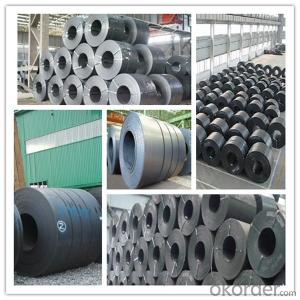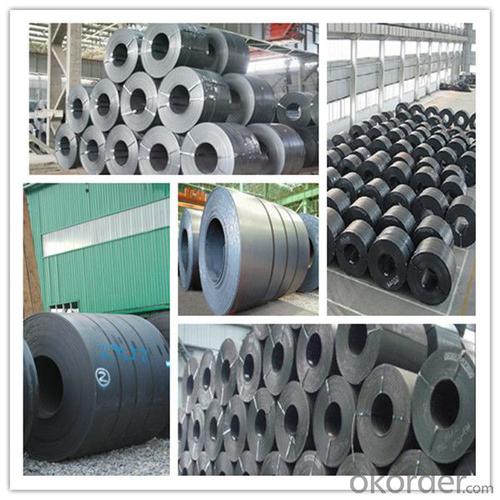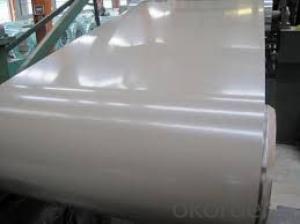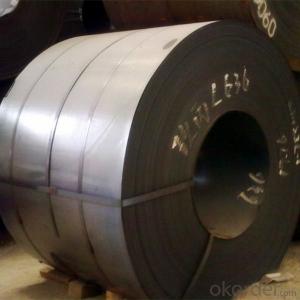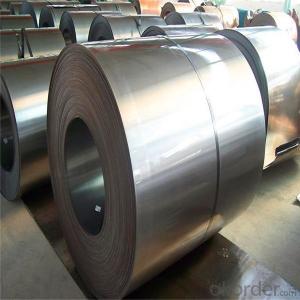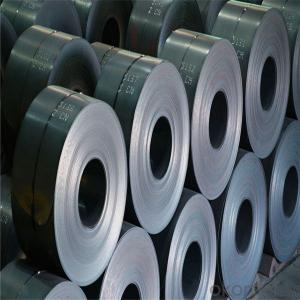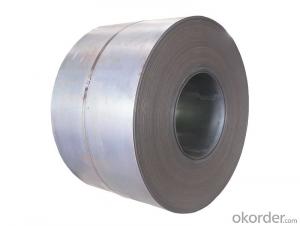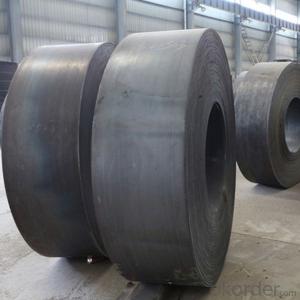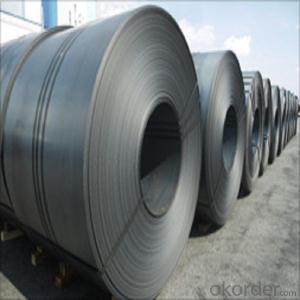Prime Hot Rolled Steel Sheets in Coils Steel Coil China Supplier
- Loading Port:
- China main port
- Payment Terms:
- TT OR LC
- Min Order Qty:
- 23 m.t.
- Supply Capability:
- 10000 m.t./month
OKorder Service Pledge
OKorder Financial Service
You Might Also Like
Specification
Product Description
| Production Name | Hot Rolled Steel Coils |
| Loading Port | Any Port in China |
| Thickness | 1.8mm-16mm |
| Width | 1000mm-1600mm |
| Coil Weight | 23 mt max |
| Material Grade | SS400\Q235 |
| Technique | Hot Rolled |
| Standard | GB \JIS\ASTM |
| Test | With Hydraulic Testing, Eddy Current , Infrared Test |
| Surface | 1) Bared |
| 2) Oiled | |
| Package | Standard Export Packing,Or at Customer’s Requirement |
| Sample | Common products, we can provide freely, for special production,we can depends on negotiation. |
| Payment | 100% L/C at sight, 30% T/T in advance |
| Delivery time | Within 10-25 days, according to quantity, asap save customer’s time |
| Certificate | ISO |
Usage
Products are widely used in various areas,such as millitary, aerospace, transportation, equipment manufacturing, shippin, petroleum pipe line, buildings etc.
Product images
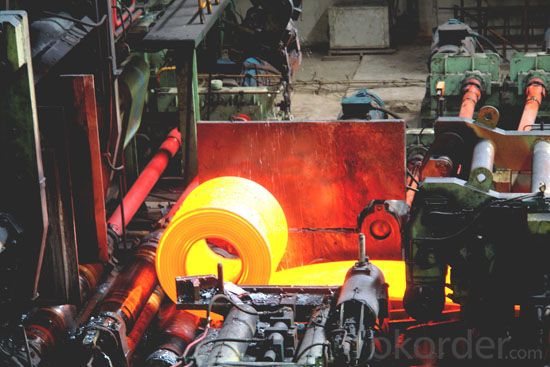
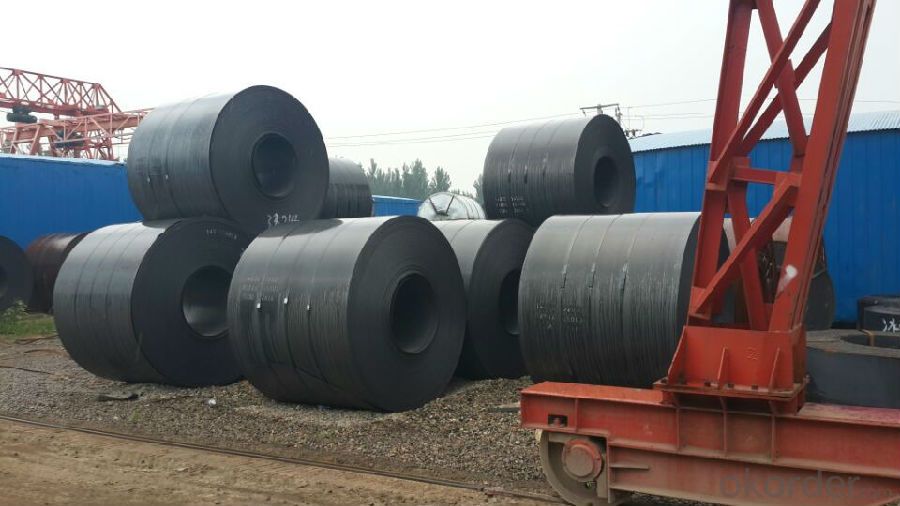
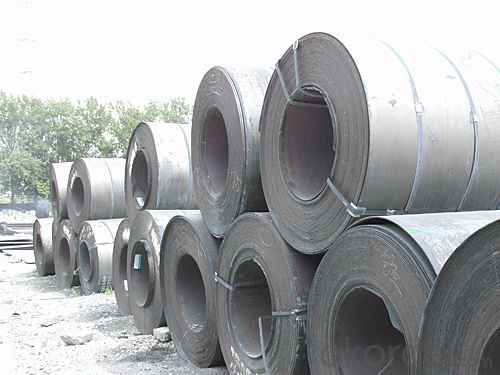
Our Service
Delivery time | 20-35days after receiving the payment of 30% deposit. |
Payment | -Irrevocable L/C at sight. |
-30% T/T in advance and 70% balance against copy of B/L. | |
Packing | -Standard Export Packing |
-According to customer's request. | |
Load port | Tianjin port, Shanghai port, Ningbo port or customer's request |
Feedback | If you have any questions, please feel free to contact us at any time possible. |
We will reply as soon as possible. | |
After Sale | Any questions of the production, please let me know directly by email or phone. |
We can deal with these issues on time, promise give you happy answers. | |
We focused on the after sale. Welcome send any comments to us. |
- Q: How are steel coils used in various industries?
- Steel coils are used in various industries for their durability and versatility. They are commonly used in automotive, construction, and manufacturing industries for making structures, machinery, and appliances. Steel coils are also utilized in the energy sector for producing power generation equipment and in the transportation industry for making ships and railcars. Overall, steel coils play a significant role in providing strength and reliability in a wide range of industrial applications.
- Q: What are the different coil leveling machine configurations used for steel coils?
- Steel coils can be processed using various coil leveling machine configurations, each designed to meet specific requirements. One commonly used configuration is the four-high leveling machine, consisting of a stack of four leveling rolls. These rolls apply pressure to flatten and level the steel coil. This configuration is ideal for thicker and heavier coils, as it offers greater pressure and control. Another option is the six-high leveling machine, which comprises two stacks of three leveling rolls each. The steel coil passes through the first stack for initial leveling and then through the second stack for further refinement. This configuration is suitable for thinner coils, allowing for a more precise and gentle leveling process. Additionally, combination leveling machines are available, integrating leveling with other processes like slitting or shearing. These machines provide a comprehensive solution for steel coil processing, particularly in applications requiring multiple steps to achieve the desired final product. Choosing the right coil leveling machine configuration depends on factors such as coil thickness, weight, desired precision, and efficiency. Manufacturers and processors must carefully assess their specific needs to select the appropriate configuration, ensuring optimal results in the steel coil leveling process.
- Q: i need some ideas of what material could replace iron or steel to make fridges, stoves, dishwashers, tractors, aircrafts, cars and buses and anything else that is made of iron and steel. anything is greatly appreciated as at the moment i have no idea what to put down.
- Material selection is a complex area. Iron and steel are very good materials in terms of their strength, stiffness and hardness (especially when compared to their density to give specific strength/stiffness. They are also relatively cheap and the economics of material selection is often the over-riding criteria. Each individual substitution has to be considered on the merits of what the component has to do and the environment in which it operates and often to replace steel with, say, aluminium, might not be appropriate or might require a redesign of the component to accomodate the lower strength and stiffness. Take one of your examples of a dishwasher; To replace the (cheap and thin) steel outer casing with aluminium would require thicker sheet to achieve the same stiffness. To replace the stainless steel inner you would need a corrosion resistant material (which rules out aluminium) which can be easily fabricated to shape. Nickel alloys would be harder to process and very expensive, but you might be able to use a bronze alloy. If you have time look in the library for a book on materials selection by Ashby - one of the best texts on the subject.
- Q: What are the common coil thicknesses available for steel coils?
- The available thicknesses for steel coils, which are commonly used in different industries and applications, can vary depending on specific requirements. The range of coil thicknesses for steel typically falls between 0.5mm and 3mm. In lightweight applications or situations where flexibility is necessary, thinner steel coils with thicknesses ranging from 0.5mm to 1.5mm are often preferred. These thinner coils find suitability in automotive body panels, roofing, and general sheet metal fabrication. On the other hand, for applications that demand higher strength and durability, thicker steel coils with thicknesses ranging from 1.5mm to 3mm are frequently employed. These thicker coils are commonly seen in heavy-duty construction, structural components, and industrial equipment manufacturing. It is important to keep in mind that these mentioned ranges are general and can be subject to variation depending on specific project requirements or customer preferences. Steel coil thicknesses can be tailored to meet specific needs, providing greater flexibility across various industries.
- Q: What is stainless steel 316, and what are its properties and uses?
- For machined aspects 416 cautioned. For welded aspects 316 is cautioned. besides the shown fact that 316 supplies a greater advantageous corrosion resistance. oftentimes the only benefit for 416 is machinability others than that 316 is greater advantageous
- Q: How are steel coils inspected for color consistency?
- Steel coils are inspected for color consistency through visual inspection by trained personnel. They compare the color of the coils against a color standard to ensure uniformity and consistency across the entire batch.
- Q: In the warehouse management system of steel coil
- The warehouse is set to be required under the factories and production equipment and manpower planning, reasonable layout; to strengthen the internal economic responsibility system, scientific division, forming material export management assurance system; the service must implement the work quality standard > standardization, application of modern management technology and the ABC classification method, and constantly improve the level of warehouse management.
- Q: i need the same kind of body jewelry they use in the piercing shop but when i go to order them they say stainless steel, not surgical steel, and i have REALLY sensitive skin so i need to be sure, whats the difference?
- There are hundreds of different grades of stainless steel. Jewelery used for piercings should be made of implant grade. Note that the term surgical steel is not a technical term. It doesn't mean anything, although it sometimes refers to what is technically implant grade stainless. Implant grade stainless steel must conform to the ASTM standard 316LVM F-138-00, otherwise the seller cannot call it implant grade. This is something you should always ask about specifically. Are your stainless items F-138-00 compliant? Jewelry that only claims to be stainless isn't good enough. Jewelery sold in mall stands are typically nickel plated, bargain-basement low grade stainless. Allergies to nickel are common.......BUT there is a big difference between allergies, and infections. Infections are caused by bacteria, not by the metal itself, and if you're getting infections it's a sign you're not keeping the piercing clean and sanitary. Simply switching to a different metal won't prevent infections from recurring. To prevent infections you need to take steps to keep new piercing clean and sanitary. the best way to do this is rinse with 50:50 hydrogen peroxide and water daily, then apply some neosporin. hope this helps.
- Q: What are the different grades of steel used for manufacturing coils?
- The different grades of steel used for manufacturing coils include low carbon steel, medium carbon steel, high carbon steel, and stainless steel.
- Q: I'm trying to make a corset but I can't find any steel boning in my area. Any clue as to what materials I could buy to to make my own bones, or anything that would work similarly?I know there are places to buy it online, but the cost of shipping makes it barely seem worth it.
- Don't try it. For two main reasons: 1. Corset boning is not just strips of flat steel; it is made from coiled high tension spring steel with clever metal ends to prevent tearing any fabric that comes into contact. You could try strips of hard wood such as teak, ash, oak. The risk is that the st rips will break when they bend around your corseted figure. Then they'll be dangerous and could puncture your skin. 2. Corset bones are there in the corset to support the fabric; not to exert any pressure on you for figure reduction. It is the cut of the fabric that produces the shape, but bones stop the fabric from crinkling, or gathering into your waist as the tension is applied. That is why commercial bones are specially made to be fairly lightweight, flexible in the right directions for your figure, and will not rust or otherwise deteriorate with wear or careful cleaning. So go for easiest you can get from the Net. That's my advice. OK?
Send your message to us
Prime Hot Rolled Steel Sheets in Coils Steel Coil China Supplier
- Loading Port:
- China main port
- Payment Terms:
- TT OR LC
- Min Order Qty:
- 23 m.t.
- Supply Capability:
- 10000 m.t./month
OKorder Service Pledge
OKorder Financial Service
Similar products
Hot products
Hot Searches
Related keywords
